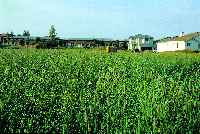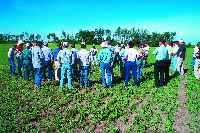| | Preventing conflict | Managing conflict | Resolving conflict
In recent years, the number and intensity of conflicts involving farmers has increased. Debates have arisen over environmental, political, economic and social issues. Many of the debates have concerned livestock operations, but conflicts related to cropping operations can also occur.

Good communication helps prevent conflicts.
Courtesy of ARD
A 1998 survey of Canadian farm organizations and producers identified conflict over farm practices as one of the leading threats to the agricultural industry's future competitiveness. Neighbours of farming operations are concerned about issues like odours from manure spreading, noise and dust storms that can harm their quality of life as well as environmental concerns like the risk of contamination of surface water (such as rivers, streams, lakes and wetlands) and groundwater.
This chapter outlines ways to prevent and resolve conflict, and describes some BMPs to help avoid some of the common causes of conflicts for cropping operations.
Conflict is a struggle between two or more people because of a real or perceived difference in needs or values. Properly managed, conflict can be productive because it can:
- encourage people to examine issues more carefully.
- deepen our understanding of problems.
- open the door to new ideas and alternative solutions.
- help foresee the consequences of proposed actions.
- enable people to take risks and solve problems.
Learning the skills necessary to prevent, manage and resolve conflict is important in today's society. The following tips and strategies to help producers prevent, manage and resolve conflict are based on focus groups involving producers and government representatives held by the Canadian Farm Business Management Council (CFBMC).
- For more information on conflict management, see Farming with Neighbours, A Guide for Canadian Farmers on Preventing and Resolving Community Conflicts over Farming Practices, from the Canadian Farm Business Management Council (phone: 1-800-232-3262).
Preventing Conflict
The most important thing producers can do to reduce the risk of conflict is to ensure communication with neighbours is open, honest and thorough. This kind of communication improves mutual understanding and increases the possibility of solving problems in a way that meets the needs of both the producer and the neighbours.
Participants in the CFBMC's focus groups suggested that compliance with the laws governing farm management practices should be regarded as the bare minimum. Using 'progressive' farm management practices, including the BMPs covered in this manual, will help prevent conflicts.

Becoming more involved in your community can help to reduce conflicts.
Courtesy of ARD
Be a good neighbour
Being a good neighbour helps to build "social capital" that can be drawn upon like a bank account when problems arise.
Practices to strengthen your relationship with your neighbours include:
- getting to know the neighbours and letting them get to know your operation.
- being friendly.
- being helpful to neighbours in need.
- getting involved in the community.
- supporting local businesses and hiring local youths.
- supporting and making donations to local charities and community groups such as sports teams and youth groups.
- hosting a farm tour, picnic/barbecue or potluck to generate goodwill and provide an opportunity for neighbours to ask questions about your operation in a relaxed atmosphere (see box).

Farm tours are one way to let your neighbours know about your operation.
Courtesy of ARD
Tips for tours and open houses
- Find out who's coming, why, and what they want to see.
- Decide in advance and tell guests whether photos are allowed.
- Do a dry run. Walk all around the farm, ideally with a non-farm friend to get input on the way guests will see it.
- Ensure there are no hazards to public safety on the tour and that the farm is clean and tidy and livestock are healthy. Avoid waste disposal areas, sick animals, and storage areas for medications and agri-chemicals.
- Anticipate questions guests are likely to ask, including questions on challenging issues, such as food safety, genetically modified foods, chemicals and residues, air, water quality, and soil pollution. Have clear, factual, well-reasoned answers ready for these questions.
- Prepare some written information about your farm to have as a hand-out at the open house or to use when you invite people to visit.
- Practice answering questions with family members or colleagues. Video the practice session. Appear confident; otherwise people may think you are avoiding questions or concealing the truth.
- If you don't know the answer to a question, say so. Then offer to find out. Do not be baited into saying something that you may regret later.
- Draw attention to farming practices that address society's concerns as well as the agri-food industry's contribution to the economy and community fabric.
- Tailor each tour/presentation to the audience.
- Have technical experts available to answer questions and enhance confidence in your operation.
- Provide washrooms.
- Smile. Have fun. Guests should leave with good feelings about the tour.
Evaluate your operation
Make sure you are following the regulations and standards that govern your operation, and also look for practical ways to go beyond these minimum requirements. The Alberta Environmental Farm Plan program is one way for you to evaluate your current operation and begin assessing options for areas where you would like to make improvements.
- For more information about Alberta's Environmental Farm Plan program, call phone toll-free: 1-866-844-AEFP (2337); or visit the program's website at http://www.albertaefp.com.
Develop contacts and skills
Identify people who support your operation and keep them informed about it. You can enlist their help if concerns arise.
Working with staff from municipal and provincial governments can help you to learn about alternative practices that might suit your farm, and it can help them to learn about you and your operation.
Consider taking some courses to improve your skills in communication and dealing with people. For example, a conflict management course could help you deal more effectively with any concerns that arise, or a course on communicating with the news media could help you to bring forward your views.
Managing Conflict
Sometimes conflict is unavoidable, no matter how much effort has been made to resolve an issue. When conflict does erupt, manage it to minimize the damage.
Canadian farmers who participated in the CFBMC focus groups had the following tips to help prevent a conflict from escalating:
- Take the matter seriously. Don't try to deny there's a problem.
- Stay calm. Don't get angry or defensive. Don't blame, accuse, chide or belittle other people; it could escalate the conflict.
- Think before acting or speaking. "Sleep on it." Be diplomatic.
- Don't let small, specific conflicts mushroom into big, broad conflicts. Ask lots of questions. Find out what the other person is upset about. Don't debate their issues.
- Search out and identify the real issues. What people say may be quite different from what they're really concerned about. Often people's concerns are rooted in fear of change or the unknown or a lack of understanding, or fear of losing control or the ability to influence decisions that will affect them.
- Deal with emotions first. Then deal with the subject of the conflict.
- Listen to and validate concerns. Acknowledge understanding of the concerns and offer to look into the matter.
- Be prompt when getting back to complainants.
- Stay on top of ongoing problems. Keep people informed of changes on the farm and progress being made.
- Do whatever is practical to fix problems and mitigate damage.
- Always tell the truth.
- Admit to mistakes. Make amends if possible. Take responsibility for employees' actions.
- When others make mistakes, help them save face.
- Shift the emphasis to mutually acceptable solutions.
- For more information, see the Canadian Farm Business Management Council's Preventing, Managing and Resolving Conflicts on Canadian Farms.
Resolving Conflict
Good communication is essential for resolving conflicts. Listen and understand first before explaining your own intentions. Focus on understanding the meaning of your neighbours' message from their perspective as communicated by their words and behaviour.
The consequences of failing to resolve conflicts may include:
- bad publicity, loss of credibility, and loss of goodwill
- fines and penalties
- lawsuits and appeals
- referendums and petitions
- more regulations for the whole industry
- increased probability of future conflicts
Role of the Farmers' Advocate
If you are unable to resolve your conflict, you may be able to turn to the Office of the Farmers' Advocate of Alberta. Under the amended Agricultural Operation Practices Act (AOPA), the Farmers' Advocate now has a formal process for mediating complaints about non-regulatory concerns like noise, smoke and odours from agricultural operations.
Where a complaint concerns an agricultural operation that is meeting the regulations, the Farmers' Advocate will provide the operator and the complainant with a way to resolve their disagreement outside of the courts. The resolution process can help to identify practical ways the farmer can address neighbours' concerns. The process can also help complainants to better understand what is involved in acceptable agricultural practices; this can be especially important for people who are new to living in rural areas.
If this mediation process is unsuccessful, then the Farmers' Advocate can set up an Agricultural Practices Review Committee, made up of industry peers, to determine whether the operation is following generally accepted practices. The peer review committee is composed of people operating in the same sector as the operation the complaint is levelled at. The committee conducts a detailed study of the operation and develops some directions or suggestions.
If the dispute remains unresolved, then a report is written which can be used by the court system.
Back to Chapter 8 - Community Relations |
|